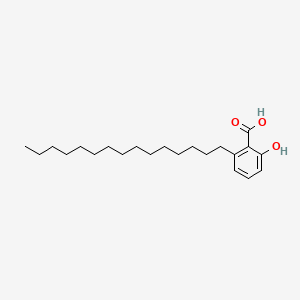| Authors | Title | Published | Journal | PubMed Link |
|---|---|---|---|---|
| Jain S et al. | Auto-acetylation stabilizes p300 in cardiac myocytes during acute oxidative stress, promoting STAT3 accumulation and cell survival. | 2012 | Breast Cancer Res. Treat. | pmid:22562121 |
| Omanakuttan A et al. | Anacardic acid inhibits the catalytic activity of matrix metalloproteinase-2 and matrix metalloproteinase-9. | 2012 | Mol. Pharmacol. | pmid:22745359 |
| Wisastra R et al. | Anacardic acid derived salicylates are inhibitors or activators of lipoxygenases. | 2012 | Bioorg. Med. Chem. | pmid:22789707 |
| Park WJ and Ma E | Inhibition of PCAF histone acetyltransferase and cytotoxic effect of N-acylanthranilic acids. | 2012 | Arch. Pharm. Res. | pmid:22941480 |
| Kusio-Kobialka M et al. | Inhibition of PCAF by anacardic acid derivative leads to apoptosis and breaks resistance to DNA damage in BCR-ABL-expressing cells. | 2013 | Anticancer Agents Med Chem | pmid:23157591 |
| Kim MK et al. | Topical application of anacardic acid (6-nonadecyl salicylic acid) reduces UV-induced histone modification, MMP-13, MMP-9, COX-2 and TNF-α expressions in hairless mice skin. | 2013 | J. Dermatol. Sci. | pmid:23228850 |
| Kuno A et al. | Resveratrol improves cardiomyopathy in dystrophin-deficient mice through SIRT1 protein-mediated modulation of p300 protein. | 2013 | J. Biol. Chem. | pmid:23297412 |
| Seong YA et al. | Anacardic acid induces mitochondrial-mediated apoptosis in the A549 human lung adenocarcinoma cells. | 2013 | Int. J. Oncol. | pmid:23314312 |
| Mamidyala SK et al. | Efficient synthesis of anacardic acid analogues and their antibacterial activities. | 2013 | Bioorg. Med. Chem. Lett. | pmid:23416004 |
| Sun Y et al. | Epigenetic regulation of spinal CXCR2 signaling in incisional hypersensitivity in mice. | 2013 | Anesthesiology | pmid:23756451 |
| Azad MA et al. | Electrolysed reduced water decreases reactive oxygen species-induced oxidative damage to skeletal muscle and improves performance in broiler chickens exposed to medium-term chronic heat stress. | 2013 | Br. Poult. Sci. | pmid:23815735 |
| Seong YA et al. | Induction of the endoplasmic reticulum stress and autophagy in human lung carcinoma A549 cells by anacardic acid. | 2014 | Cell Biochem. Biophys. | pmid:23955513 |
| Hung CH et al. | Environmental alkylphenols modulate cytokine expression in plasmacytoid dendritic cells. | 2013 | PLoS ONE | pmid:24039973 |
| Ravnskjaer K et al. | Glucagon regulates gluconeogenesis through KAT2B- and WDR5-mediated epigenetic effects. | 2013 | J. Clin. Invest. | pmid:24051374 |
| Liu Z et al. | Histone acetyltransferase p300 promotes MKL1-mediated transactivation of catechol-O-methyltransferase gene. | 2013 | Acta Biochim. Biophys. Sin. (Shanghai) | pmid:24096006 |
| Wisastra R et al. | Discovery of a novel activator of 5-lipoxygenase from an anacardic acid derived compound collection. | 2013 | Bioorg. Med. Chem. | pmid:24231650 |
| Legut M et al. | Anacardic acid enhances the anticancer activity of liposomal mitoxantrone towards melanoma cell lines - in vitro studies. | 2014 | Int J Nanomedicine | pmid:24489469 |
| Zhou Q et al. | Small ubiquitin-related modifier-1 modification regulates all-trans-retinoic acid-induced differentiation via stabilization of retinoic acid receptor α. | 2014 | FEBS J. | pmid:24819975 |
| Huang H et al. | Anacardic acid induces cell apoptosis associated with induction of ATF4-dependent endoplasmic reticulum stress. | 2014 | Toxicol. Lett. | pmid:24853302 |
| Horibe T et al. | Discovery of protein disulfide isomerase P5 inhibitors that reduce the secretion of MICA from cancer cells. | 2014 | Chembiochem | pmid:24920482 |
ANACARDIC ACID
ANACARDIC ACID is a lipid of Polyketides (PK) class.
